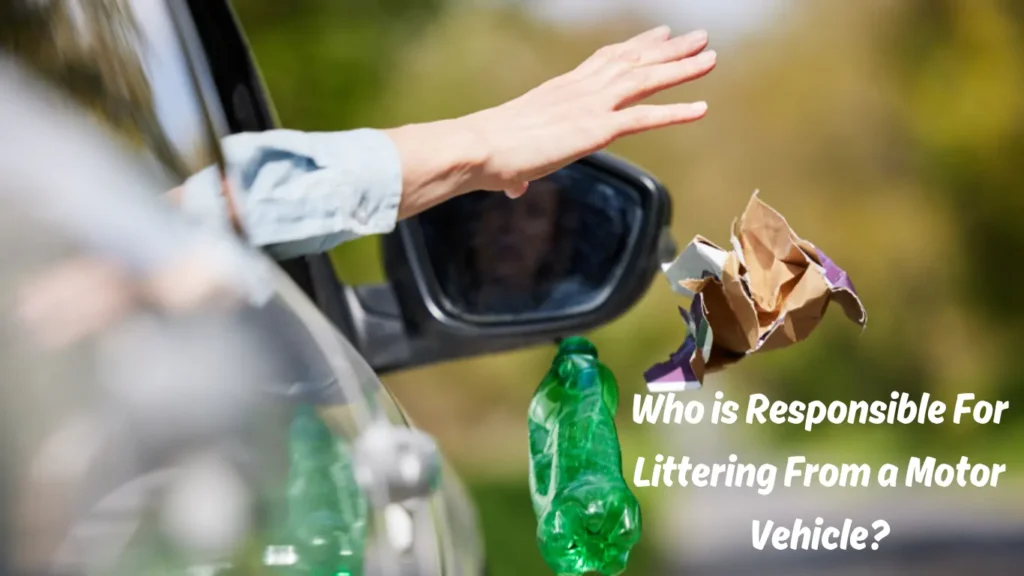Ever driven past a car and watched a fast-food bag fly out of the window?
It’s frustrating, right? But here’s the bigger question: who actually gets the blame? Is it the driver? The passenger? The vehicle owner? You’re not the only one asking.
This article is for people searching for a clear, practical explanation of who’s held legally responsible when litter is tossed from a moving vehicle. Maybe you’ve been fined unfairly, or maybe you’re just a curious citizen who wants to understand how the law works. Either way — let’s break it down together.
What the Law Says: Who Gets the Fine?
In most jurisdictions, the registered owner of the vehicle is presumed responsible for littering from their car — even if they weren’t the one who tossed the trash.
Why the Vehicle Owner?
Because enforcing the law gets tricky when officers don’t know who did it. In the absence of specific identification, most laws pin responsibility on the vehicle owner by default.
Think of it like a speeding camera: it doesn’t matter who was driving — the ticket goes to whoever owns the car.
But What If It Was a Passenger?
Great question. Here’s where nuance matters.
If a passenger throws something out the window and is clearly identified, they can be held directly responsible.
If nobody is identified, the fine or charge typically falls on the registered vehicle owner.
Real-World Example:
In states like California and New York, vehicle owners can contest a littering citation if they can prove someone else in the vehicle did it. But that often requires evidence, like dash cam footage or a witness.
Legal Definitions of “Littering From a Vehicle”
It’s not just about tossing wrappers. Here’s what qualifies as vehicle-related littering under most local and state laws:
- Throwing garbage, bottles, cigarettes, or food wrappers out the window
- Letting trash fall out of a truck bed or open container
- Even “accidental littering” — like letting a bag blow away from an open window
Laws often state something like:
“No person shall throw, discard, or deposit any litter upon any highway or public lands from a motor vehicle, whether moving or stationary.”
Related Laws You Should Know
1. Owner Liability Presumption
In many regions, if no one is identified, the owner is legally presumed responsible.
2. Secondary Offenses
Some jurisdictions treat littering as a secondary offense — meaning police need another reason to stop the car first (like speeding or no seatbelt).
3. Enhanced Penalties
Repeat offenders or those tossing hazardous materials (e.g., lit cigarettes) may face higher fines, community service, or even license points.
What Happens If You’re Caught?
Penalties can vary, but here’s a rough idea:
| Location | Fine Range | Additional Penalties |
| California | $100 – $1,000 | Community service, points on license |
| Texas | Up to $500 | Possible jail time for repeat offenders |
| UK | £150 on the spot | Owner can be fined even if not present |
Pro tip: If you receive a fine and didn’t commit the act, respond quickly. Some jurisdictions allow you to contest with evidence or written testimony.
Why It Matters (More Than You Think)
Littering isn’t just about “a little trash.” It has real consequences:
- Environmental Damage – Plastic and debris can harm wildlife and waterways.
- Public Safety Risks – Objects thrown from cars can hit other vehicles or cause accidents.
- Economic Costs – Cities spend millions each year on roadside cleanup.
It’s not just a ticket. It’s about community responsibility.
How to Avoid Getting Blamed for Litter You Didn’t Drop
- Install a dash cam — It’s your best defense if someone else in your car litters.
- Educate your passengers — Let friends and family know it’s not just “your car,” it’s your name on the ticket.
- Keep a car trash bag — Simple, but effective.
- Secure all loose items in truck beds or open containers.
- Report serial litterers — Many cities have hotlines or mobile apps for this.
FAQs About Littering From a Motor Vehicle
Q1: Can I get fined if someone else in my car litters?
Yes. If the person can’t be identified, the vehicle’s registered owner is usually fined.
Q2: How can I dispute a littering fine?
Submit evidence (like dash cam footage or witness statements) showing you weren’t the one responsible.
Q3: Is littering from a moving car considered a criminal offense?
In some areas, yes — especially if it’s repeated or hazardous. Check your local laws.
Q4: Are commercial vehicle owners also liable?
Typically, yes. Companies may be fined unless they can identify the responsible employee.
Conclusion
In short, when it comes to “Who is Responsible For Littering From a Motor Vehicle?”, the answer is usually the vehicle owner — unless clear evidence proves otherwise.
And while the law is about accountability, the bigger picture is about respect — for our roads, our neighborhoods, and the environment we all share.
Final Tip:
Treat your car like your home. You wouldn’t toss trash on your living room floor, right? Keep a small trash bin in your car and set the example for others.
